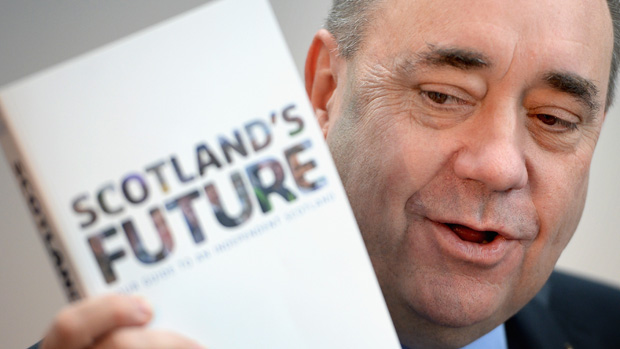How Scottish independence would work: blueprint unveiled
No rise in basic rate of tax, childcare system transformed and Royal Mail back in public sector

A free daily email with the biggest news stories of the day – and the best features from TheWeek.com
You are now subscribed
Your newsletter sign-up was successful
THE Scottish government has unveiled its blueprint for an independent Scotland, highlighting its financial strengths and the benefits of being in control of its own resources. The White Paper is being hailed by the Scottish National Party as a "landmark document", with the case for economic growth and fairness at its heart.
So what exactly does it say?
No rise in basic tax: The Scottish government points to estimates that show Scotland has generated more tax per head than the UK as a whole. After independence, tax and social security rates would be "set in line with the wishes of the people of Scotland", it says, and promises no rise in basic tax.
The Week
Escape your echo chamber. Get the facts behind the news, plus analysis from multiple perspectives.

Sign up for The Week's Free Newsletters
From our morning news briefing to a weekly Good News Newsletter, get the best of The Week delivered directly to your inbox.
From our morning news briefing to a weekly Good News Newsletter, get the best of The Week delivered directly to your inbox.
Westminster taxes abolished: The married couples tax allowance, introduced by the UK government, would be abolished in an independent Scotland as it does not help all families and parents, says the SNP. Westminster's "bedroom tax" would also be abolished, saving 82,500 households in Scotland - including 63,500 households with a disabled adult and 15,500 households with children - an average of £50 per month.
Competitive business taxation: The Scottish government promises to reduce the rate of corporation tax by up to three percentage points to counter the business pull of London.
Childcare transformation: The White Paper sets out a transformation in childcare provision to enable mothers to return to work more easily. Every child aged three and four will be entitled to 30 hours of childcare per week in term time.
Pensions: Pensions will be protected with a "triple lock", meaning that they are guaranteed to increase by either inflation, earnings or 2.5 per cent, depending on which is highest. From 6 April 2016, new pensioners will receive a Scottish single-tier pension, set at the rate of £160 per week - £1.10 higher than the rate currently expected for the UK.
A free daily email with the biggest news stories of the day – and the best features from TheWeek.com
Benefits: The Scottish government would ensure that benefits and tax credits increase "at least in line with inflation" to avoid the poorest families falling further into poverty. It would also halt the roll-out of Universal Credit, the new single payment for people who are looking for work or on a low income, and Personal Independence Payments, the new payment for people with disabilities.
No more nuclear: Trident nuclear weapons, currently based on the Clyde, would be removed within the first parliament.
Royal Mail nationalised: The Scottish government would return the Royal Mail to public ownership in Scotland.
Status quo: Some things will stay the same. An independent Scotland would retain the pound and the Queen would continue to be head of state. Independence would not affect the day-to-day management of the NHS in Scotland and Scotland would continue as a member of the EU.
Immigration: A points-based immigration system would be introduced, targeted at particular Scottish needs. For example, incentives might be given to migrants who are prepared to live and work in more remote geographical areas of the country.